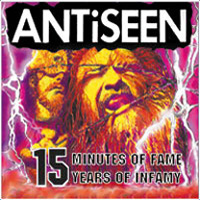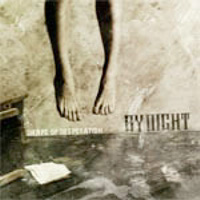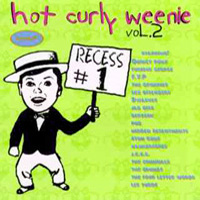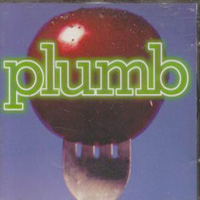 Plumb
Plumb
(Silvertone)
An interview with Tiffany Arbuckle
by Scott Hefflon
What does the name Plumb mean to you?
It’s nothing extremely exciting. There’s a Suzanne Vega song called “My Favorite Plumb” which I think is beautiful and has really inspired me. I decorate my house with it, and I just hate the fact that it’s not in season all the time. My mom recently told me that in the book of Amos, it talks about being “the plumb line,” meaning balanced and level, so it’s kinda come to mean that too.
Is Suzanne Vega an inspiration to you?
Definitely. She’s been around for a long time, and I’ve always listened to her. I’m not very old, so when people ask me what my influences are, I’m like, “Well, I’m 22…” I didn’t really start getting into music until I was in high school, so I’d say I was big 10,000 Maniacs fan when Natalie Merchant was in the band, I love the Sundays, I love the vocal strength behind Céline Dion, but I’m not a big fan of her style.
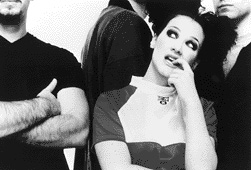 What did you do before Plumb?
What did you do before Plumb?
I was a background singer. I did session work in Nashville, singing both on band’s records and live. But I started out as a bank teller, singing in coffee houses, nursing homes, and homeless shelters – anywhere where people would listen. It was fun, it was more of a hobby to me. I love singing songs that convey a positive message, that give people hope. Obviously in a nursing home or homeless shelter, there’s not a lot of hope. I went out on tour with a pop band, not very well-known, and that really gave me a taste of what it’s like going out on the road. When I got home, there was a message from a record label on my machine saying they’d heard me and they thought I should do my own thing.
They signed you based on our strength as a backup singer?
Yeah. I got the band together because I didn’t want to do a solo thing, I wanted to get a band together, come up with a name, do pictures, videos, and have us all be part of the creative process and play live together.
Did the other band members already have a band together?
No, they were just players in town. They’d all been in bands that brought them to Nashville, or they were going to school there. From being around town, we’d all become friends. I’d seen them all play and knew we could work together.
Thad, the guitarist, got left off the bio, and someone else’s name is credited for guitar on the album.
We’re not quite sure how that all happened. I think it’s because he wasn’t able to make the photo shoot. Stephen was the fill-in guitarist who played the hidden track and a few shows with us, but he was never a permanent member of the band. We hadn’t officially brought Thad in, so the label used what they had.
What was the inspiration to go from a backup singer to taking a shot at center stage?
Doing background singing and session vocals, I saw a lot of people expressing through their songs what they’d been through, the passion in their voices told of the pain they’d suffered, the happiness they’d experienced, and they were able to share that. And I thought, “There’s been so much in my life that I need to share with people.” So if this album is not about me personally, it’s about someone very, very close to me. “Unforgivable” is about verbal abuse. I’ve never been verbally abused, and I’m very blessed to’ve never had that happen to me, but my best friend in high school was. Her step-father was extremely abusive, always comparing her to her step-sister who was his real daughter. I watched it over and over, how damaging it was and how hard it was for her to forgive him. There was hope in that situation when she finally forgave him.
What about “Pennyless,” is that another song of hopelessness?
Yes, that song is about my uncle who I haven’t seen in five or six years. He’s homeless. He went to college and was determined to become a millionaire. When he realized he was never going to obtain his goal, his pride got in the way and he decided that he didn’t want to do anything. Once every few years he’ll show up, but then you wake up one morning and he’s gone again.
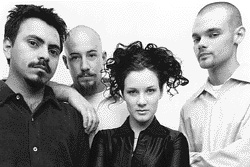 Do you think he found a kind of freedom we can’t even imagine? Free from the pressures of social status and competitive accumulation?
Do you think he found a kind of freedom we can’t even imagine? Free from the pressures of social status and competitive accumulation?
I don’t think he wanted freedom, I think everything just lost meaning to him. He comes from a loving family and has a very good education, but he’s hopeless. The song is also about looking at yourself in the mirror and wishing you didn’t have all the faults, all the problems that you do. But thinking of someone like my uncle, you realize how much you have to be thankful for. We spend so much of our lives searching for things we already have and things that are right in front of us.
What’s “Sobering” about? I imagine that as your first single.
It’s the first song my brother Brandon and I wrote together, then Dan and Matt (co-producers) spiced it up in the studio. Brandon and I were talking about all the pressures people feel to be something they’re not. Everyone is made different, yet everyone feels they need to act the same in order to fit in. We used a wine glass as a muse, an image to represent the situation, so it’s not really about alcohol at all. It’s basically saying to stand up for what you believe in when you believe in something, and not to be afraid to stay seated when you don’t. The main theme is to not be afraid to say, “I don’t know. I don’t have an answer.” I tend to trust and respect people more if they have the strength to say they don’t know, rather than making something up to try to cover up the fact that they don’t.
People that “already know” everything never grow because they never learn anything. They plateau because they don’t have the intellectual curiosity to become more, or they lack the courage to admit they aren’t the best at everything and that others can teach them something.
Exactly. The song, unlike “Unforgivable” and “Pennyless,” is about what we’ve seen in general, not about one specific person. “Willow Tree” is specifically about my aunt and uncle. My aunt was a severe alcoholic. Alcohol became her #1 priority, instead of her husband. That song was about misplacing your priorities and how it makes things fall apart. The song is also about unconditional love. I was raised in a very spiritual home. “Willow Tree” is a parallel to my personal relationship with God, saying that if I put things in front of Him, I lose my focus and things don’t flow as easily. My aunt’s life fell apart because alcohol didn’t belong in the #1 spot, but her husband loved her so much, and so unconditionally, that he never left her and he always knew how to reach her. When she finally saw where she went wrong, she put the bottle down and ran to him. He embraced her without reproaching her for her past mistakes.
Your uncle’s support itself is inspirational. It takes a lot of strength to stand by someone. Many people turn their backs at the first sign of hardship, stranding the other person to sink or swim on their own.
No kidding.
What about your climb to stardom? Has it been a long, hard road, or has it been fun?
It’s been a blast, really. If each one of those songs was about me personally,I was the alcoholic,I was the abused kid, this record would’ve been really tough. But many of the songs are about people in my life who have inspired me to write and to bring a message of hope to others. Yes, the record is dark, and it is about pain, but there’s hope in that pain. There’s a reason for pain. Valleys are brought into your life so you can appreciate the mountaintops.
When you’re in the valley, do you ever get frustrated because climbing to the mountaintop seems like so much work?
There are a lot of mountain tops that I don’t think I deserve. That’s kind of what “Endure” is about – when you think being caught in the downpour is so awful and you don’t think you can take it anymore. Somewhere in my spirit, I know it’s going to go away, it’s going to get better. Each hour goes by and you don’t think you can make it through another one. Then, all of the sudden, the rainbow appears and it’s all over. You’re so glad you waited because the payoff is sweet.

